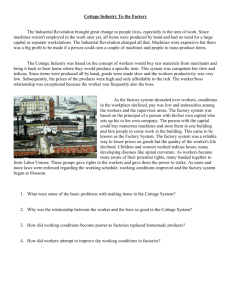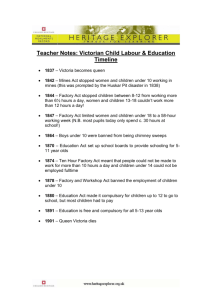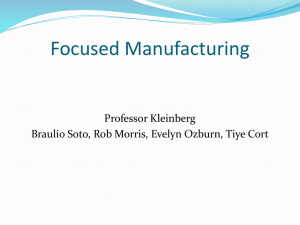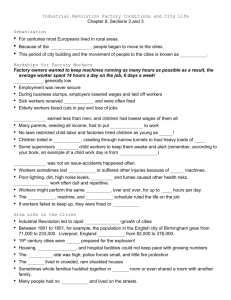Abstract of the Factories Act, 1948 - Factories and Boilers Inspection
advertisement
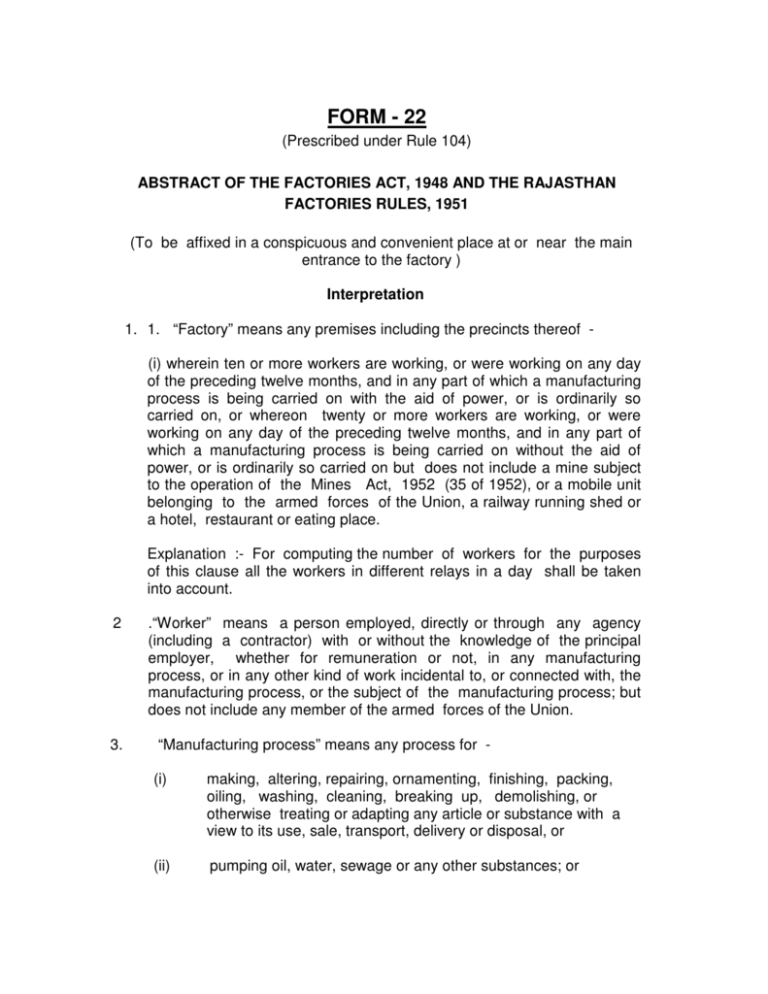
FORM - 22 (Prescribed under Rule 104) ABSTRACT OF THE FACTORIES ACT, 1948 AND THE RAJASTHAN FACTORIES RULES, 1951 (To be affixed in a conspicuous and convenient place at or near the main entrance to the factory ) Interpretation 1. 1. “Factory” means any premises including the precincts thereof (i) wherein ten or more workers are working, or were working on any day of the preceding twelve months, and in any part of which a manufacturing process is being carried on with the aid of power, or is ordinarily so carried on, or whereon twenty or more workers are working, or were working on any day of the preceding twelve months, and in any part of which a manufacturing process is being carried on without the aid of power, or is ordinarily so carried on but does not include a mine subject to the operation of the Mines Act, 1952 (35 of 1952), or a mobile unit belonging to the armed forces of the Union, a railway running shed or a hotel, restaurant or eating place. Explanation :- For computing the number of workers for the purposes of this clause all the workers in different relays in a day shall be taken into account. 2 3. .“Worker” means a person employed, directly or through any agency (including a contractor) with or without the knowledge of the principal employer, whether for remuneration or not, in any manufacturing process, or in any other kind of work incidental to, or connected with, the manufacturing process, or the subject of the manufacturing process; but does not include any member of the armed forces of the Union. “Manufacturing process” means any process for (i) making, altering, repairing, ornamenting, finishing, packing, oiling, washing, cleaning, breaking up, demolishing, or otherwise treating or adapting any article or substance with a view to its use, sale, transport, delivery or disposal, or (ii) pumping oil, water, sewage or any other substances; or (iii) generating, transforming or transmitting power; or (iv) composing types of printing, printing by letter press, lithography, photogravure or other similar process or book binding; or (v) constructing, reconstructing, repairing, refitting, finishing or breaking up ships or vessels ; or (vi) preserving or storing any article in cold storage. Working hours, holidays, intervals after rest, etc. 4. Hours of work for adults (Sections 51 and 54) - No adult worker shall be required or allowed to work in a factory for more than 48 hours in any week and for more than 9 hours in any day. 5. Relaxation of hours of work for adult (Section 64) - The ordinary limits on working hours of adults may be relaxed in certain special cases, e.g., workers engaged on urgent repairs; in work in the nature or preparatory or complementary work which must necessarily be carried on outside the limits laid down for the general working of the factory; in work which is necessarily so intermittent that the intervals for rest; in any work which for technical reasons must be carried on continuously; in making or supplying articles of prime necessity which must be made or supplied every day; in a manufacturing process which cannot be carried on except during fixed seasons, or at times dependent on the irregular action of natural forces; in engine rooms or boiler houses or in attending to power plant or transmission machinery; in the printing of news papers, who are held up on account of the breakdown of machinery; in the loading or unloading of railway wagons or lorries or trucks; and in any work which is notified by the State Government in the Official gazette as a work of national importance. Except in the case of urgent repairs, the relaxation shall not exceed the following limits of work inclusive of overtime :(i) (ii) (iii) (iv) the total number of hours of work in any day shall not exceed ten; the spread over inclusive of intervals for rest, shall not exceed 12 hours in any one day; the total number of hours of work in a week, including overtime, shall not exceed sixty; the total number of hours of overtime work shall not exceed fifty for any one quarter. 6. Payment for overtime (Section 59) - Where a worker works in a factory for more than 9 hours in any day or for more than 48 hours in any week, he shall, in respect of overtime work, entitled to wages at the rate of twice his ordinary rate of wages. 7. Exemption of supervisory staff (Section 64) - Chapter VI, other than the provisions of clause (b) of sub-section (1) of section 66 and of the proviso to that sub-section, of the Act-Working hours of adults - does not apply to persons holding positions of supervision or management or are employed in a confidential position in a factory, provided that where the ordinary rate of wages of such person does not exceed rupees seven hundred and fifty per month, they are entitled to extra wages in respect of overtime work under Section 59. 8. Weekly holiday (Adults) (Section 52) - No adult worker shall be required or allowed to work in a factory on the first day of the week, unless (a) he has, or will have, a holiday for a whole day on one of the three days immediately before or after the said day, and (b) the manager of the factory has, before the said day or the substituted day under clause (a) whichever is earlier, - (i) delivered a notice at the office of the Inspector of his intention to require the worker to work on the said day and of the day which is to be substituted; and (ii) displayed a notice to that effect in the factory: Provided that no substitution shall be made which will result in any worker working for more than ten days consecutively without a holiday for a whole day. 9. Compensatory holidays (Section 53)- Where a worker in a factory, as a result of exemption from the ordinary provision relating to weekly holidays, is deprived of any of the weekly holidays, he shall be allowed, within the month in which the holidays were due to him or within the two months immediately following that month, compensatory holidays of equal number of the holidays so lost. 10. Intervals for rest for adults (Section 55 and 56) - The periods of work of adult workers in a factory each day shall be fixed that no period shall exceed 5 hours and that no worker shall work for more than 5 hours before he has had an interval for rest of at least half an hour and that inclusive of his intervals for rest shall not spread over more than ten and a half hours in any day or, with the permission of the Chief Inspector in writing, 12 hours. 11. Prohibition of double employment (Section 60,71 & 99) - No child or, except in certain circumstances, an adult worker, shall be required or allowed to work in any factory on any day on which he has already been working in any other factory. If a child works in a factory on any day on which he has already been working in another factory, the parent or guardian of the child or the person having custody of or control over him or obtaining any direct benefit from his wages, shall be punishable with fine, which may extend to Rs. 50 unless it appears to the court that the child so worked without the consent or connivance of such parent, guardian or person. 12. Prohibition of employment of children under 14 (Section 67) - No child who has not completed his fourteenth year shall be required or allowed to work in any factory. 13. Hours of work for children (Section 71) - No child shall be employed or permitted to work in any factory for more than four and a half hours in any day and during the period of at least twelve consecutive hours which shall include the interval between 10 P.M. and 6. A.M. The periods of work of all children employed in a factory shall be limited to two shifts which shall not overlap or spread over more than 5 hours each and each child shall be employed in only one of the relays. The provision relating to weekly holidays shall also apply to child workers and no exemption from this provision may be granted in respect of any child. 14. Prohibition of employment of women (Section 66) - No women shall be required or allowed to work in any factory except between the hours of 6 A.M. and 7 P.M. The State Government may vary these limits or exempt this restriction in case of women working in fish-curing or fishcanning factories. Leave with wages 15. Leave with wages (Section 79, 80 and 83 and Rules)- Every worker who has worked for a period of 240 days or more in a factory during a calendar year shall be allowed during the subsequent calendar year leave with wages for a number of days calculated at the rate of - (i) if an adult, one day for every twenty days of work performed by him during the previous calendar year; and (ii) if a child, one day for every 15 days of work performed by him during the previous calendar year. Explanation. 1. For the purpose of this sub-section – (a) any days of lay off, by agreement or contract or as permissible under the standing orders; (b) in the case of female worker, maternity leave for any number of days not exceeding twelve weeks; and (c) the leave earned in the year prior to that in which the leave is enjoyed; shall be deemed to be days on which the worker has worked in a factory for the purpose of computation of the period of 240 days or more, but he shall not earn leave for these days. Explanation. 2. The leave admissible under this sub-section shall be exclusive of all holidays whether occurring during or at either end of the period of leave. For the leave allowed to him, a worker shall be paid at a rate equal to the daily average of his total full-time earning, for the days on which he actually worked during the month immediately preceding the leave exclusive of any overtime and bonus, but inclusive of dearness allowance and the cash equivalent of the advantage accruing through the concessional sale to the worker of food grains and other articles. A worker whose service commences otherwise than on the first day of January shall be entitled to leave with wages at the rate indicated above, if he has worked for two-thirds of the total number of days in the remainder of the calendar year. If a worker is discharged or dismissed from service or quits his employment or is supperanuated or dies while in service, during the course of the calendar year, he or his heir or nominee as the case may be, shall be entitled to wages in lieu of the quantum of leave to which he was entitled immediately before his discharge, dismissal, quitting of employment, superannuation or death, calculated at the rates specified above, even if he had not worked for the entire period specified above. Such payment shall be made – (i) whether the worker is discharged or dismissed or quits employment, before the expiry of the second working day from the day of such discharge, dismissal or quitting; and (ii) where the worker is superannuated or dies while in service, before the expiry of two months from the date of such superannuation or death. If the employment of a worker who is entitled to leave with wages is terminated by the occupier before he has taken the entire leave to which he is entitled, or if having applied for and having not been granted such leave, the worker quits his employment before he has taken the leave, the occupier of the factory shall pay him the amount payable in respect of the leave not taken, and such payment shall be made before the expiry of the second working day after the day on which his employment is terminated and a worker who quits his employment, on or before the next pay day. The manager shall maintain a register of leave with wages in the prescribed Form 20 and shall provide each worker with a book called the “Leave Book” in the prescribed Form 21. The leave book shall be the property of the worker and the manager or his agent shall not demand it except to make entries of the dates of holidays or interruptions in service, and shall not keep it for more than a week at a time. If a worker loses his leave book, the manager shall provide him with another copy on payment of paise ..............and shall complete it from his record. Health 16. Cleanliness (Section 11)- Except in cases specially exempted, all inside walls and partitions, all ceilings or tops of rooms and all walls, sides and tops of passages and stair-cases in a factory shall be kept whitewashed or colour washed. The whitewashing or colour washing shall be carried out at least once in every period of fourteen months. The floor of every workroom shall be cleaned at least once in every week by washing, using disinfectant, where necessary, or by some other effective method. 17. Disposal of wastes and effluents (Section 12)Effective arrangements shall be made in every factory for the treatment of wastes and effluents due to the manufacturing process carried on therein, so as to render them innocuous, and for their disposal. 18. Ventilation and temperature (Section 13)- Effective and suitable provision shall be made in every factory for securing and maintaining in every workroom adequate ventilation by the circulation of fresh air and such a temperature as will secure to workers therein reasonable conditions of comfort and prevent injury to health. 19. Overcrowding (Section 16)- Unless exemption has been granted, there shall be in every workroom of a factory in existence on the date of commencement of this Act at least 350 cubic feet and of a factory built after the commencement of this Act at least 500 cubic feet of space for every worker employed therein, and for this purpose no account shall be taken of any space which is more than 14 feet above the level of the floor of the room. 20. Lighting (Section 17)- In every part of a factory where workers are working or passing, there shall be provided and maintained sufficient and suitable lighting, natural artificial, or both. 21. Drinking water (Section 18 and Rules)- In every factory effective arrangements shall be made to provide and maintain at suitable points conveniently situated for all workers employed therein, a sufficient supply of wholesome drinking water. In every factory wherein more than 250 workers are ordinarily employed the drinking water shall, during hot weather be cooled by ice or other effective methods. The cooled drinking water shall be supplied in every canteen, lunchroom and restroom and also at conveniently accessible points throughout the factory. 22. Latrines and urinals (Section 19 and Rules)- In every factory sufficient latrine and urinal accommodation of the prescribed types (separate enclosed accommodation for male and female workers) shall be provided conveniently situated and accessible to workers at all times while they are at the factory. Every latrine shall be under cover and so partitioned off as to secure privacy and shall have a proper door and fastenings. Sweepers shall be employed whose primary duty it would be to keep clean latrines, urinals and washing places. 23. Spittoons (Section 20)- In every factory, there shall be provided a sufficient number of spittoons of the type prescribed in convenient places and they shall be maintained in clean and hygienic condition. No person shall spit within the premises of factory except in the spittoons provided for purpose. Whoever spits in contravention of this provision shall be punishable with fine not exceeding five rupees. Safety 24. Fencing of machinery (Section 21)- In every factory dangerous parts of machinery e.g., every moving part of a prime mover and every flywheel connected to prime mover, etc. shall be securely fenced by safeguards of substantial construction which shall be constantly maintained and kept in position while the parts of machinery they are fencing in motion or in use. 25. Work on or near machinery in motion (Section 22)- No woman or young person shall be allowed in any factory to clean, lubricate or adjust any part of a prime mover or any transmission machinery when in motion, or to clean, lubricate or adjust any part of any machine if the cleaning, lubrication or adjustment thereof would expose the woman or young person to risk of injury from any moving part either of that machine or of any adjacent machinery. 26. Employment of young persons on dangerous machines (Section 23)No young person shall work at any machine declared to be dangerous unless he has been fully instructed as to the dangers arising in connection with the machine and precautions to be observed and has received sufficient training in work at the machine or is under adequate supervision by a person who has a thorough knowledge and experience of the machine. 27. Casing of new machinery (Section 26)- In all machinery driven by power and installed in any factory after the commencement of this Act, every set screw, bolt or key on any revolving shaft, spindle, wheel or pinion shall be so sunk, encased or otherwise effectively guarded as to prevent danger; all spur, worm and other toothed or friction gearing which does not require frequent adjustment while in motion shall be completely encased, unless it is so situated as to as safe as it would be if it were completely encased. Whoever sells or lets on hire or, as agent of a seller or hirer, causes or procures to be sold or let on hire, for use in a factory any machinery driven by power which does not comply with these provisions or any rules made under this section, shall be punishable with imprisonment for a term which may extend to three months or with fine which may extend to five hundred rupees or with both. 28. Prohibition of employment of women and children near cotton openers (Section 27)- No woman or child shall be employed in any part of a factory for pressing cotton in which a cotton opener is at work. 29. Excessive weights (Section 34 and Rules)- No woman or young person shall, unaided by another person, lift, carry or move by hand or on head, any material, article, tool or appliance exceeding the maximum limit in weight set out in the following schedule :SCHEDULE Persons (a) Adult male (b) Adult female (c) Adolescent male (d) Adolescent female (e) Male child (f) Female child Maximum weight of material, article, tool or appliance 55 Kilograms 30 Kilograms 30 Kilograms 20 Kilograms 16 Kilograms 14 Kilograms 30. Protection of eyes (Section 35 and Rules)- Effective screens or suitable goggles shall be provided for the protection of persons employed in or in the immediate vicinity of processes which involve risk of injury to eyes from particles or fragments thrown off in the processes or which involve risk of injury to eyes by reason of exposure to excessive light or infra-red or ultra-violet radiations. 31. Precautions in case of fire (Section 38 and Rules)- Every factory shall be provided with adequate means of escape in case of fire for the persons employed therein. The doors affording exit from any room shall, unless they are of sliding type, be constructed to open outwards. Every window, door or other exit affording a means of escape in case of fire, other than the means of exit in ordinary use, shall be distinctively marked. Effective and clearly audible means of giving warning in case of fire to every person employed in the factory shall be provided. Effective measures shall be taken to ensure that wherein more than twenty workers are ordinarily employed in any place above the ground floor, or wherein explosive or highly inflammable materials are used or stored, all the workers are familiar with the means of escape in case of fire and have been adequately trained in the routine to be followed in such case. Welfare 32. Washing facilities (Section 42 and Rules)- In every factory adequate and suitable facilities for washing shall be provided and maintained for the use of the workers therein. Such facilities shall include soap and nail brushes or other suitable means of cleaning and the facilities shall be conveniently accessible and shall be kept in a clean and orderly condition. If female workers are employed separate washing facilities shall be provided and so enclosed or screened that the interiors are not visible from any place where persons of the other sex work or pass. 33. Facilities for storing and drying clothing (Section 43 and Rules)- In the case of certain dangerous operations e.g., lead processes, liming and tanning of raw hides and skins etc. suitable places for keeping clothing not worn during working hours and for the drying of wet clothing shall be provided and maintained. 34. Facilities for sitting (Section 44)- In every factory suitable arrangements for sitting shall be provided and maintained for all workers obliged to work in a standing position in order that they may take advantage of any opportunities for rest which may occur in the course of their work. 35. First-aid and ambulance room (Section 45) - There shall in every factory be provided and maintained sops to be readily accessible during all working hours first-aid boxes or cupboards equipped with the prescribed contents. Each first-aid box or cupboard shall be kept in the charge of a separate responsible person who holds a certificate in first-aid treatment recognised by the State Government who shall always be available during the working hours of the factory. In every factory wherein more than 500 workers are ordinarily employed there shall be provided and maintained an ambulance room of the prescribed size, containing the prescribed equipment, and in the charge of such medical and nursing staff as may be prescribed and those facilities shall always be made readily available during the working hours of the factory. 36. Canteens (Section 46 and Rules)- In specified factories wherein more than 250 workers are ordinarily employed, a canteen or canteens shall be provided and maintained by the occupier for the use of the workers. Food, drink and other items served in the canteen shall be sold on a non-profit basis and the prices charged shall be subject to the approval of a Canteen Managing Committee which shall be appointed by the manager and shall consist of an equal number of persons nominated by the occupier and elected by the workers. The number of elected workers shall be in the proportion of 1 for every 1,000 workers employed in the factory, provided that in no case shall there be more 5 or less than 2 workers on the Committee. The Committee shall be consulted from time to time as to the quality and quantity of food stuffs to be served in the canteen, the arrangement of the menus, etc. etc. Where the canteen is managed by a cooperative society, it is not necessary to appoint a Canteen Managing Committee and the prices to be charged may include a margin of profit up to a maximum of 5 per cent of its working capital. 37. Shelters, restrooms and lunchrooms (Section 47)- In every factory wherein more than 150 workers are ordinarily employed, adequate and a suitable lunchroom, with provision for drinking water, where workers can eat meals brought by them, shall be provided and maintained for the use of the workers. 38. Creches (Section 48 and Rules)- In every factory wherein more than 30 women workers are ordinarily employed there shall be provided and maintained a suitable room or rooms for the use of children under the age of six years of such women. The creche shall be adequately furnished and equipped and in particular there shall be one suitable cot or a cradle with the seating accommodation for the use of each mother while she is feeding or attending to her child, and a sufficient supply of suitable toys for older children. There shall be in or adjoining the creche a suitable washroom for the washing of the children and their clothing. An adequate supply of clean clothes, soap and clean towels shall be made available for each child while it is in the creche at least a quarter litre of clean pure milk shall be available for each child on every day it is accommodated in the creche and the mother of such a child shall be allowed in the course of her daily work suitable intervals to feed the child. For children above two years of age, there shall be provided, in addition, an adequate supply of wholesome refreshment. A suitably fenced and shady open air playground shall also be provided for the older children. 39. Welfare Officers (Section 49)- In every factory wherein 500 or more workers are ordinarily employed the occupier shall employ in the factory such number of Welfare Officers as may be prescribed. Special Provisions 40. Dangerous operations (Section 87 and Rules) - Employment of women, adolescents and children is prohibited or restricted in certain operations declared to be dangerous, e.g., electroplating, manufacture and repair of electric accumulators, glass manufacture, grinding or glazing of metals, manufacture and treatment of lead and certain compounds of lead, sand blasting, etc. 41. Notice of accidents (Section 88 and Rules)- When an accident occurs which results in the death of any person or which results in such bodily injury to any person as is likely to cause his death, or any dangerous occurrence specified in the schedule annexed hereto takes place in a factory, the manager of the factory shall forthwith send a notice thereof by telephone, special messenger or telegram to the Inspector and the Chief Inspector. When any accident or any dangerous occurrence specified in the schedule annexed hereto, which results in the death of any person or which results in such bodily injury to any person as is likely to cause his death, takes place in a factory, forthwith notice shall be sent also to the District Magistrate or Subdivisional Officer, to the officer-in-charge of the nearest police station; and to the relatives of the injured or deceased person. SCHEDULE 1. Bursting of a plant used for containing or supplying steam under pressure greater than atmospheric pressure. 2. Collapse or failure of a crane, derrick, winch, hoist or other appliances used in raising or lowering persons or goods, or any part thereof, or the overturning of a crane. 3. Explosion, fire, bursting out, leakage or escape of any molten metal, or hot liquor or gas causing bodily injury to any person or damage to any room or place in which persons are employed, or fire in rooms of cotton pressing factories when a cotton opener is in use. 4. Explosion of a receiver or container used for the storage at a pressure greater than atmospheric pressure of any gas or gases (including air) or any liquid or solid resulting from the compression of gas. 5. Collapse or subsidence of any floor, gallery, roof, bridge, tunnel, chimney, wall, building or any other structure. 42. Notice of certain diseases (Section 89 and Rules)- Where any worker in a factory contracts any of the following diseases, the manager of the factory shall send notice in Form 27 thereof forthwith both to the Chief Inspector and the Certifying Surgeon :Lead, phosphorus, mercury, manganese, arsenic, carbon bi-sulphide or benzene poisoning; or poisoning by nitrous fumes or by halogens or halogen derivatives of the hydrocarbons of the aliphatic series; or of chrome ulceration, anthrax, silicosis, toxic anaemia, toxic jaundice, primary opitheliomatous cancer of the skin, or pathological manifestations due to radium or other radio-active substances or xrays. 43. No charge for facilities and convenience (Section 114)- No fee or charge shall be realised from any worker in respect of any arrangements or facilities to be provided, or any equipments or appliances to be supplied by the occupier under the provisions of this Act. 44. Powers of Inspectors (Sections 9 and 82)- Inspectors have power to inspect factories any time and may require the production of registers, certificates, etc. prescribed under the Act and the Rules. Any Inspector may institute proceedings on behalf of any workers to recover any sum required to be paid by an employer under the provisions relating to leave with wages, which the employer has not paid. 45. Obligations of workers (Section 97 and 111)- No worker in a factory : (i) shall wilfully interfere with or misuse any appliance, convenience or other thing provided in a factory for the purposes of securing the health, safety or welfare of the workers therein; (II) shall wilfully and without any reasonable cause do anything likely to endanger himself or others; and (iii) shall wilfully neglect to make use of any appliance or other thing provided in the factory for the purpose of securing the health or safety of the workers therein. If any worker employed in a factory contravenes any of these provisions or any rule or order made there under he shall be punishable with imprisonment for a term which may extend to three months, or with fine which may extend to Rs.100 , or with both. If any worker employed in a factory contravenes any provision of this Act or any rules or orders made there under, imposing any duty or liability on workers, he shall be punishable with fine which may extend to Rs. 20. 46. Certificates of fitness (Sections 69, 70 and 98)- No child who has completed his fourteenth year or an adolescent shall be required or allowed to work in any factory unless a certificate of fitness granted with reference to him is in the custody of the manager of the factory and such child or adolescent carries, while he is at work, a token giving a reference to such certificate. Any fee payable for such a certificate shall be paid by the occupier and shall not be recoverable from the young person, his parents or guardian. An adolescent who has been granted a certificate of fitness to work in a factory as an adult and who while at work in a factory carries a token giving reference to the certificate shall be deemed to be an adult for all the purposes of the provisions of the Act relating to the working hours of adults and the employment of young persons. An adolescent who has not been granted a certificate of fitness to work in a factory as an adult shall, notwithstanding his age, be deemed to be a child for all the purposes of this Act. Whoever knowingly uses or attempts to use, as a certificate of fitness granted to himself, a certificate granted to another adolescent to work in a factory as an adult, or who having procured such a certificate knowingly allows it to be used, or an attempt to use it to be made, by another person, shall be punishable with imprisonment for a term which may extend to two months or with fine which may extend to Rs. 100 or with both. 47. Registers, notices and returns (Sections 61, 62, 63, 72, 73, 74 and 110 and Rules)- A register of adult workers in the prescribed Form 17 and a register of child workers in the prescribed Form 19 shall be maintained by the manager of every factory. A notice of periods of work for adults and a notice of periods of work for children in the prescribed forms 16 and 18 shall be correctly maintained and displayed in every factory. No adult worker or child shall be required or allowed to work in any factory otherwise than in accordance with their respective notices of periods of work displayed in the factory. The owners, occupiers or managers of factories shall submit the prescribed periodical returns to the Inspector regularly.

